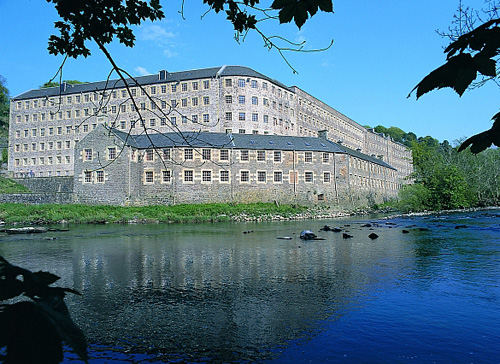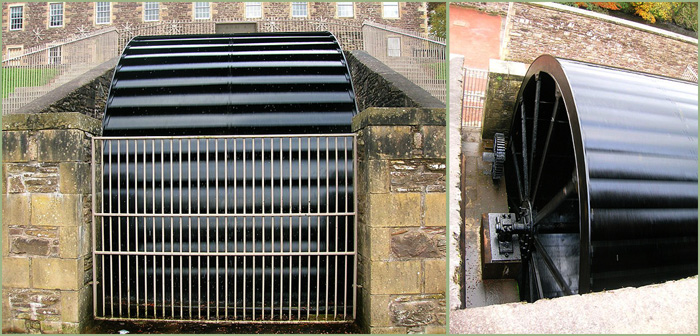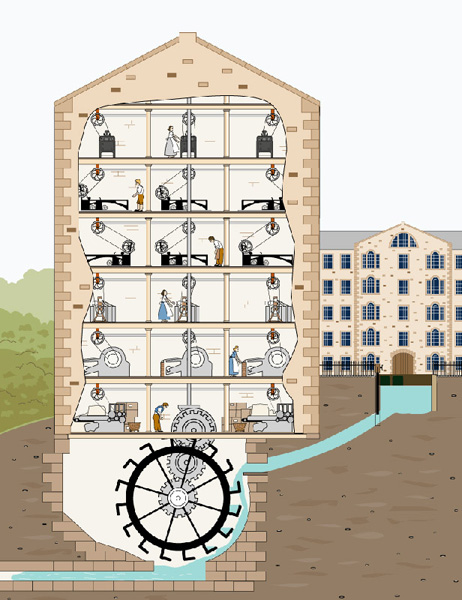-
Industrial Archaeology
Great Britain 1989.07.04
In issue: Stamp(s): 4
Printing: photogravure
-
Number by catalogue: Michel: 1208 Yvert: 1386 Scott: 1289
Perforation type: 14 ¼x14 ¾
Subject:
32 pences. Tekstill watermill in New Lanark, on the River Clyde, Strathclyde, Scotland*
Additional:
*The cotton mills and workers' housing at New Lanark in Strathclyde sow the human side of industrialism, for it was here that social reformer of XIX century Robert Owen put into practice far-reaching ideas on social reform to banish the slums and 'dark satanic mills' of the Industrial Revolution.
Philanthropy in New Lanark (1800)
During a visit to Glasgow he fell in love with Caroline Dale, the daughter of the New Lanark mill's proprietor David Dale. Owen induced his partners to purchase New Lanark, and after his marriage with Caroline in September 1799, he set up home there. He was manager and part owner of the mills (January 1810). Encouraged by his great success in the management of cotton mills in Manchester, he hoped to conduct New Lanark on higher principles and focus less on commercial principles.
The mill of New Lanark had been started in 1785 by Dale and Richard Arkwright. The water-power afforded by the falls of the Clyde made it a great attraction. About two thousand people had associations with the mills. Five hundred of them were children who were brought at the age of five or six from the poorhouses and charities of Edinburgh and Glasgow. The children had been well treated by Dale, but the general condition of the people was very unsatisfactory. Many of the workers were in the lowest levels of the population; theft, drunkenness, and other vices were common; education and sanitation were neglected; and most families lived in only one room. The respectable country people refused to submit to the long hours and demoralising drudgery of the mills.
Many employers operated the truck system, whereby payment to the workers was made in part or totally by tokens. These tokens had no value outside the mill owner's "truck shop." The owners were able to supply shoddy goods to the truck shop and still charge top prices. A series of "Truck Acts" (1831-1887) stopped this abuse. The Acts made it an offence not to pay employees in common currency. Owen opened a store where the people could buy goods of sound quality at little more than wholesale cost, and he placed the sale of alcohol under strict supervision. He sold quality goods and passed on the savings from the bulk purchase of goods to the workers. These principles became the basis for the Co-operative shops in Britain that continue to trade today.
His greatest success, however, was in the support of the young, to which he devoted special attention. He was the founder of infant childcare in Great Britain, especially in Scotland. Though his reform ideas resemble European reform ideas of the time, he was likely not influenced by the overseas views; his ideas of the ideal education were his own.
Though at first regarded with suspicion as a stranger, he soon won the confidence of his people. The mills continued to have great commercial success, but some of Owen's schemes involved considerable expense, which displeased his partners. Tired at last of the restrictions imposed on him by men who wished to conduct the business on the ordinary principles, Owen, in 1813, arranged to have them bought out by new found investors. These, who included Jeremy Bentham and a well-known Quaker, William Allen, were content to accept just £5000 return on their capital, allowing Owen a freer scope for his philanthropy. In the same year, Owen first authored several essays in which he expounded on the principles which underlay his education philosophy.
Owen had originally been a follower of the classical liberal and utilitarian Jeremy Bentham. However, as time passed Owen became more and more socialist, whereas Bentham thought that free markets (in particular, the rights for workers to move and choose their employers) would free the workers from the excess power of the capitalists.
From an early age, he had lost all belief in the prevailing forms of religion and had thought out a creed for himself, which he considered an entirely new and original discovery. The chief points in this philosophy were that man's character is made not by him but for him; that it has been formed by circumstances over which he had no control; that he is not a proper subject either of praise or blame. These principles lead up to the practical conclusion that the great secret in the right formation of man's character is to place him under the proper influences - physical, moral and social - from his earliest years. These principles - of the irresponsibility of man and of the effect of early influences - form the key to Owen's whole system of education and social amelioration. They are embodied in his first work, A New View of Society, or Essays on the Principle of the Formation of the Human Character, the first of these essays (there are four in all) appearing in 1813. Owen's new views theoretically belong to a very old system of philosophy, and his originality is to be found only in his benevolent application of them.
Robert Owen's house in New Lanark
For the next few years Owen's work at New Lanark continued to have a national and even a European significance. His schemes for the education of his work-people attained to something like completion on the opening of the institution at New Lanark in 1816. He was a zealous supporter of the factory legislation resulting in the Factory Act of 1819, which, however, greatly disappointed him. He had interviews and communications with the leading members of government, including the premier, Robert Banks Jenkinson, Lord Liverpool, and with many of the rulers and leading statesmen of Europe.
New principles were also adopted by Robert Owen in raising the standard of goods produced. Above each machinist's workplace, a cube with different coloured faces was installed. Depending on the quality of the work and the amount produced, a different colour was used. The worker then had some indication to others of his work's quality. The employee had an interest in working to his best. Though not in itself a great incentive, the conditions at New Lanark for the workers and their families were idyllic for the time.
New Lanark itself became a much frequented place of pilgrimage for social reformers, statesmen, and royal personages, including Nicholas, later emperor of Russia. According to the unanimous testimony of all who visited it, New Lanark appeared singularly good. The manners of the children, brought up under his system, were beautifully graceful, genial and unconstrained; health, plenty, and contentment prevailed; drunkenness was almost unknown, and illegitimacy was extremely rare. The relationship between Owen and his workers remained excellent, and all the operations of the mill proceeded with the utmost smoothness and regularity. The business was a great commercial success.


Topics: Industrial mills Watermills



1989-s-logo.jpg)